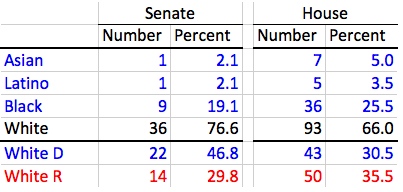Del. Mary Ann Listanti (D-Harford) has been roundly and rightly called out for using a horrible racist slur ever since Ovetta Wiggins’s reporting over at the Washington Post brought it to public attention. Many of her colleagues, party officials, and activists have called for her resignation.
Bizarrely, however, the General Assembly has appeared far more tolerant of Del. Jay Jalisi’s (D-Baltimore County) repeatedly harmful actions in his public and private life as opposed to Lisanti’s hurtful words. Recall that Wiggins also reported that Del. Jay Jalisi’s daughter successfully applied for a protective order in 2015:
According to court documents, Jalisi’s daughter, 18-year-old Alizay Jalisi, applied for the protective order after her father allegedly slapped her late last month during an argument, the Associated Press reported. He was not criminally charged in the case, and Jalisi has denied the allegations.
“I just chose to be the parent and end the dispute with my child and save my family from more trauma,” Jalisi said in a text Monday night. “There was no finding of guilt by the court. And I am sure everything would be normalized within my family soon since the media spotlight would not be on us after today.”
Personally, I don’t believe Del. Jalisi’s denial, as no one, least of all someone in public office, would willingly accede to a protective order due to a domestic violence claim if it had not occurred. Even if the judge didn’t find him legally “guilty,” there was sufficient evidence to grant the order. As an elected official and a physician, Del. Jalisi also certainly had the agency and the ability to fight the allegations. (In an unusual career path, Del. Jalisi has now left medicine to become a real estate investor.)
The only consequence for Jalisi in the General Assembly was a transfer of committee assignments. Now, the Ethics Committee reports that Del. Jalisi has been abusing his staff and cheating them out of pay that they earned for years and has flouted past committee judgements. His atrocious behavior began soon after he was sworn into the House in 2015:
According to sworn testimony and contemporaneous emails, Delegate Jalisi instructed an aide to work approximately 100 hours of overtime, but refused to approve timesheets reflecting those hours. Delegate Jalisi also refused to allow the aide to leave work when the Maryland General Assembly was on liberal leave status and all bill hearings had been canceled due to inclement weather
According to sworn testimony, Delegate Jalisi’s behavior toward his 2015 legislative staff was “unpredictable” and often “volatile.” Delegate Jalisi treated his staff as “truant” if they left to go to the restroom or to get lunch, and required his staff to keep daily logs of their work and justify to him how the tasks listed on their logs met their job requirements. Delegate Jalisi belittled his staff and accused them of failing to complete their tasks.
Once again, Del. Jalisi denied everything despite a wealth of testimony, evidence and contemporary written accounts of his behavior. Del. Jalisi was similarly “bullying,” “abusive” and “belligerent” in 2016, 2017, 2018, and now in 2019. State troopers were called in during one incident at the Clerk’s office. People in an adjoining office filed a complaint after overhearing his loud abuse of staff. Unacceptable behavior is not a one-off for Del. Jalisi.
The General Assembly reacted very slowly to Del. Jalisi’s repeat offenses:
- In 2015, the Ethics Committee sent him an admonishing letter stating that his behavior “reflected poorly” on the General Assembly.
- The Speaker and Majority Whip spoke to him about the complaint and further bad behavior in 2016.
- In 2017, the Speaker and the Majority Whip “counseled” Del. Jalisi in March and again in October about his improper treatment of staff in both the Human Resources and Clerk’s offices.
- The Ethics Committee recommended in 2018 that Del. Jalisi not be allowed to have staff starting in 2019 if he did not complete anger management training. The committee essentially reiterated its recommendation when another incident occurred.
Del. Jalisi didn’t complete anger management training by the start of the 2019 session. According to the Ethics Committee report, he nonetheless hired staff and then later falsely promised that his company would pay the staffer when it became clear that the General Assembly would not.
The Ethics Committee recommendations are now stronger, recommending a reprimand by the full House of Delegates and that Del. Jalisi lose committee assignments as well as staff if he doesn’t completely anger management by the start of the 2020 session.
This is too little, too late. Del. Jalisi should resign.
Since Angry Delegate seems unlikely to pursue that course, he should be immediately removed from committees and prohibited from participating in any House activities beyond casting his vote, including county delegation and Democratic Caucus meetings. This should continue until he shows a stronger commitment beyond one anger management course towards mending his ways and should include restitution in some form to the many people he has abused in public office.
The people of Baltimore County and the citizens of Maryland deserve better. Though I laud its recent report, the Ethics Committee also needs to examine why it did not take action with meaningful consequences until the fourth year of Del. Jalisi’s unacceptable pattern of bullying and abuse.


